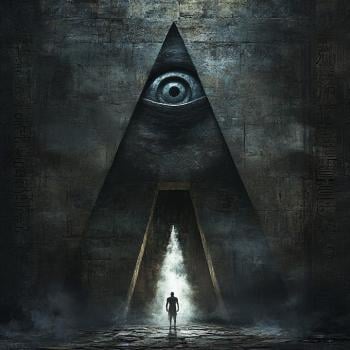
Whenever we point out that God is love, it’s not uncommon to hear at least one person chime in and say: “But God is also a god of wrath!”
Is that true? I mean, we do have one verse in the Bible that tells us that God actually is love:
“Whoever does not love does not know God, because God is love.” (1 John 4:8)
I think it’s worth noting that, while we do find verses that speak about the wrath of God, we do not find any verses that say “God is wrath.”
That, to me, is significant. So, if we ever read any verses that talk about the wrath of God, or the judgment of God, or anything else, we need to always filter that through the understanding that God is love. That means that the wrath of God is always understood through the realization that God is love. Another way to phrase it might be to say: “The wrath of the God who is love,” or “The wrath of a loving God.”
My friend Steve Kline recently shared his thoughts on this in one of his blog posts inspired by something he noticed in Psalm 18:25-27 which says:
“With the merciful you show yourself merciful; with the blameless you show yourself blameless; with the purified you show yourself pure; and with the crooked you make yourself seem tortuous.” (Psalm 18:25-27)
Here’s what Steve took from this passage:
“The conception among most Christians is that God is angry with us and that if we don’t repent then He will pour out His wrath on us…Yes, we have sinned horribly against God. We denied him…For that, we must repent if we want to enter the kingdom of God, the kingdom of heaven, eternal life.
“…But, for those that don’t repent, is it God’s wrath that will be poured out on them? Or, is it the lies and the violence of the unrepentant themselves that will come back on their own head? Throughout the Bible, we see that the pit the wicked dug they themselves fall into. Or, the snare that evil people set they get caught in themselves. And, in the depictions of Satan (for example, Goliath and Haman), he is almost always killed with his own weapon.”
“The repentant have become merciful, blameless, and purified. And, to the repentant God shows Himself as such. But, to the unrepentant, the crooked (in Psalm 18), God makes Himself seem tortuous. It seems to them like God is vengeful, spiteful, and vindictive, pouring His wrath out on them. However, in reality, it is their own lies and violence that are coming back on their own heads.”[1]
This is a key insight – from the Scriptures – that we need to take seriously. The Wrath of God is quite often something experienced as the fruit of one’s own actions rather than as the direct action of God against the unrighteous.
I believe this is exactly what’s happening all throughout the ministry of Jesus. He arrives on the scene and warns the people to repent – to literally think differently and start to live a different sort of life – or else they will suffer the consequences of their actions.
Specifically, the Jewish people in the First Century were longing for a Messiah to come and liberate them from the tyranny and rule of the Romans. That mindset is eventually what led them to suffer the total destruction of Jerusalem, their Temple, the Priesthood and the end of life as they knew it.
This is what Jesus is trying to warn them about over and over again:
“You have heard that it was said, ‘An eye for an eye and a tooth for a tooth.’ But I tell you not to resist an evil person. But whoever slaps you on your right cheek, turn the other to him also. If anyone wants to sue you and take away your tunic, let him have your cloak also. And whoever compels you to go one mile, go with him two. Give to him who asks you, and from him who wants to borrow from you do not turn away.
“You have heard that it was said, ‘You shall love your neighbor and hate your enemy.’ But I say to you, love your enemies, bless those who curse you, do good to those who hate you, and pray for those who spitefully use you and persecute you, that you may be sons of your Father in heaven; for He makes His sun rise on the evil and on the good, and sends rain on the just and on the unjust. For if you love those who love you, what reward have you? Do not even the tax collectors do the same? And if you greet your brethren only, what do you do more than others? Do not even the tax collectors do so? Therefore you shall be perfect, just as your Father in heaven is perfect.” (Matt. 5:38-48)
“Therefore whoever hears these sayings of Mine, and does them, I will liken him to a wise man who built his house on the rock: and the rain descended, the floods came, and the winds blew and beat on that house; and it did not fall, for it was founded on the rock.
“But everyone who hears these sayings of Mine, and does not do them, will be like a foolish man who built his house on the sand: and the rain descended, the floods came, and the winds blew and beat on that house; and it fell. And great was its fall.” (Matt. 7:24-27)
In the same way, the prophecy spoken by Jesus in the Olivet Discourse [See Matt. 24] is another example of the Wrath of God that was prophesied by Jesus but fulfilled by the Roman army that surrounded Jerusalem and destroyed it, just as Jesus said they would. But, this destruction was specifically in retaliation for an armed rebellion against the Roman Empire; something that Jesus urged them to repent from by following his teachings about loving their enemies and blessing those who curse them.
This sowing and reaping, or cause and effect scenario is played out all through the Gospels. But just because Jesus uses Apocalyptic language and warns his people that they face the “wrath of God” for refusing to put his teachings into practice, it does not mean that God is personally responsible for the destruction. In fact, it’s the exact opposite. God sent Jesus as a prophet to warn His people about their need to stop seeking to overthrow the Romans. Jesus told them exactly what would happen if they refused to take another approach – love their enemies, bless them, do good to them, walk the extra mile, turn the other cheek, etc.
So, this preaching was an expression of the Love of God and the Compassion of God to His people, not an expression of God’s Wrath. The goal of Christ’s message was to save them from this destructive way of living.
Unfortunately, only a few people took this new approach to heart. Those who did were saved from this destruction, but those who did not listen to Jesus were not spared the fruit of their rebellious behavior. This was not an example of God’s wrath or punishment as much as it was the effect of reaping what they, themselves, had sown in defiance of Christ’s message.
The Wrath of God, therefore, appears to be more about suffering the consequences of our own actions and less about the anger of God being expressed directly against the wicked.
What we see is that God – who is love – always works to warn us about these disastrous consequences. Because God loves us, His hope is that we will choose another path which will lead us to life and away from destruction.
In fact, the overarching sweep of the entire Scripture is that God’s entire posture towards us is always good. As Steve Gregg puts it:
“None of God’s actions, including His judgments, are without a positive purpose. This is often affirmed in Scripture…Since there are many such [verses] that speak of God’s judging as a function of His love and mercy – while there are none that tell us that God’s judgments are merely retributive…it seems inappropriate and gratuitous to interpret the few verses in Scripture about hell as if we did not have ample testimony elsewhere revealing the divine purpose and intention of saving all that were lost.”[2]
Again, we can affirm the scriptures which reveal to us the truth that “God is love” and we can see that God is not a God of wrath. He’s a God who loves us enough to warn us when our actions are leading us to destruction and he weeps for us when we fail to see the things that make for peace.

So, when we see phrases like the “wrath of the Lamb” in scripture, as in Revelation 6:16, we have to stop and ask ourselves what is really being described.
As my friend Richard Murray notes:
“Jesus is the Lamb of God. So He, by extension, is the wrath of God personified [in Revelation 6:16]. But here is the thing: Lambs have no wrath.
“So, the term is an oxymoron. It’s an image clash where wrath itself is deconstructed by the jarring contradiction of two incompatible terms. This then allows divine wrath to be conceptually recast as the restorative and curative energies of God. Hence the Lamb.
“So let’s look at both God’s birth statement and death statement regarding Jesus as the revelation of ‘the wrath of God.’
“Here is the divine wrath statement given by angelic pronouncement at His birth: ‘Peace on earth, goodwill to man.’ (Luke 2:14) Hmmm.
“And here is His bookend statement on the issue of wrath at His death: ‘Forgive them Father, for they know not what they do.’ (Luke 23:34) Hmmm.
“The ‘wrath of the Lamb’ is now revealed. Peace, goodwill, and forgiveness toward all men!”[3]
This same oxymoron is further exemplified in David Bentley Hart’s translation of the New Testament where he notes that the “Lamb” in Revelation 5:6 is more accurately rendered as “The suckling lamb”, which is the equivalent of a kitten or a newborn puppy. As he puts it:
“Not arnos or arnen – a “lamb” – but an arnion – literally, a “little lamb” or “lambkin”, a term most properly applied to a lamb that is still nursing.” [4]
So, this image of Christ as the “suckling lamb” or “newborn lambkin” further challenges the notion that the “wrath of the Lamb” is anything other than an intentionally jarring mashup of clashing ideas that lead us to rethink our notions of the Wrath of God.
What we know is this: God’s plan and purpose is always to restore us, redeem us, renew us and heal us. God’s ultimate purpose is never to hurt us, harm us or destroy us. That is what Jesus told us that our Enemy came to do, but Jesus said his mission was to undo all of that once and for all. [See John 10:10-29; 1 John 3:8]
“We must die. But that is not what God desires; rather, he devises ways so that a banished person does not remain banished from him.” (2 Sam. 14:14)
God is love. God is not wrath. God is not judgment. God is exactly like Jesus who freely forgives us and heals us. His love endures forever. And it’s the kindness of God that leads us all to repentance.
If wrath and vengeance were truly attributes of God’s character and reflections of His Divine Nature, then we might expect to see these listed alongside the other Fruits of the Spirit found in the Scriptures. After all, the Fruit of the Spirit is simply a reflection of the nature and character of God imparted to us by the Holy Spirit as we abide in Christ. These attributes – love, joy, peace, patience, kindness, gentleness and self-control – are Divine attributes. We bear these fruits because we are being transformed by the Spirit of God into people who reflect the image and nature of God as revealed in Christ.
Wrath is not an attribute of God’s nature. Vengeance is not a reflection of God’s heart. What we see in the Suckling Lamb is the true face of God.
**
NOTE: This is an excerpt from the forthcoming book “Jesus Undefeated: Condemning the False Doctrine of Eternal Suffering To Make The Gospel Great Again” by Keith Giles, Foreword by Brad Jersak. Coming Fall 2019 from Quoir Publishing.
REFERENCES:
[1] From the blog article: “New Perspective On God’s Wrath” by Steve Kline, https://www.patheos.com/blogs/keithgiles/2018/09/new_perspective_gods_wrath/
[2] “All You Want To Know About Hell”, Steve Gregg, pgs. 252 and 254
[3] The Wrath of the Lamb by Richard Murray, Facebook post, May 29, 2019
[4] “The New Testament: A Translation” by David Bentley Hart, notation on Rev. 5:6, pg. 504
**
Keith Giles was formerly a licensed and ordained minister who walked away from organized church 11 years ago, to start a home fellowship that gave away 100% of the offering to the poor in the community. Today, He and his wife live in Meridian, Idaho, awaiting their next adventure.
His newest book, “Jesus Unveiled: Forsaking Church As We Know It For Ekklesia As God Intended” releases on June 9, 2019 on Amazon, and features a Foreword by author Richard Jacobson.
His book “Jesus Unbound: Liberating the Word of God from the Bible”, is available now on Amazon and features a Foreword by author Brian Zahnd.
He is also the author of the Amazon best-seller, “Jesus Untangled: Crucifying Our Politics To Pledge Allegiance To The Lamb” with a Foreword by Greg Boyd.
Keith also co-hosts the Heretic Happy Hour Podcast on iTunes and Podbean. BONUS: Want to unlock exclusive content including blog articles, short stories, music, podcasts, videos and more? Visit my Patreon page.
Join me this summer at one of these upcoming events:
*Costa Mesa, CA – June 22 “United We Stand”
*Hot Springs, NC – July 11-14 “Wild Goose Festival”
*Woodstock, GA – July 27-28 “Unleashing the Word of God” [With Richard Murray]
Want Keith to come speak at your church or in your home town? Learn more HERE

















